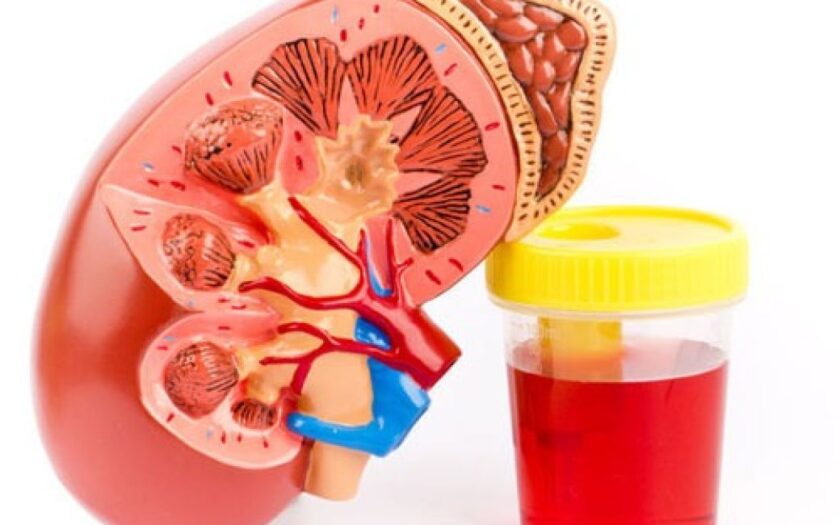Blood in your urine, known as hematuria, is a common occurrence that can be detected through a urine test or noticed visually. Normally, urine appears light yellow in color. When there is blood present, urine may appear red, pink, or brownish, or you may notice actual blood in the urine. Sometimes, blood in urine is microscopic and not visible to the naked eye.
Various factors can cause blood in urine, including infections, kidney stones, and urinary tract injuries. Additionally, certain foods like beetroot, blackberries, and rhubarb can temporarily change urine color.
Whether the blood in urine is noticeable or only detectable through a urine test, it’s important to consult your doctor for evaluation. Prompt medical assessment is necessary to determine the underlying cause and ensure appropriate management of any underlying conditions affecting urinary health.
Understanding Symptoms Associated with Blood in Urine: Signs, Causes, and When to Seek Medical Advice
Understanding the symptoms associated with blood in urine is essential for recognizing potential underlying health issues and determining when medical evaluation is necessary. This article explores common signs related to hematuria, discusses possible causes ranging from benign to serious conditions, and emphasizes the importance of seeking prompt medical advice for proper diagnosis and management.
If you have blood in your urine, accompanying symptoms can vary depending on the underlying cause.
Symptoms commonly associated with blood in urine include:
- pain or discomfort during urination (weeing);
- increased frequency of urination;
- urgency to urinate;
- pain in the abdomen (tummy) or back;
- straining while urinating;
- reduced urine stream;
- sensation of incomplete emptying of the bladder after urination.
These symptoms may indicate various conditions such as urinary tract infections, kidney stones, bladder infections, or more serious issues like kidney disease or cancer. It’s crucial to discuss any symptoms of blood in urine with a healthcare provider for proper diagnosis and treatment. Early detection and management can help prevent complications and promote urinary health.
Recognizing and understanding the symptoms linked to blood in urine is crucial for proactive healthcare management. Whether the cause is a urinary tract infection, kidney stones, or potentially more serious conditions like kidney disease or cancer, prompt medical attention ensures timely diagnosis and appropriate treatment. Regular monitoring of symptoms and seeking medical advice promptly can lead to better outcomes and overall urinary health.
Exploring the Causes of Hematuria: From Common Triggers to Potential Concerns
Blood in urine, known as hematuria, can originate from various parts of the urinary system, including the kidneys, ureters, bladder, and urethra.
The most common cause of blood in urine is a urinary tract infection (UTI), which typically affects the bladder (cystitis). Other common causes include kidney stones, kidney conditions, prostate problems, and cancers of the bladder, kidney, or prostate.
Additionally, certain medications like anticoagulants, blood clotting disorders, sickle cell anemia, endometriosis, and specific medications can also lead to hematuria.
In some cases, blood in urine may stem from reproductive organs, such as during menstruation or after sexual intercourse in females. Exercise-induced hematuria, often seen in athletes, is another possible cause, usually resolving on its own but should be evaluated by a doctor to rule out underlying issues.
Diagnosing the Underlying Causes of Hematuria: Methods and Evaluations
When you consult your doctor about blood in your urine, they will begin by discussing your symptoms and conducting a physical examination, which may include a genital examination and a prostate check for males.
To investigate further, your doctor will request a urine sample for testing and may also order blood tests to assess your overall health and check for specific conditions.
Additional diagnostic tests to evaluate your urinary system may include ultrasound scans, CT scans, MRI scans, and cystoscopy. A cystoscopy involves a specialist using a thin tube with a camera on the end to examine the inside of your bladder closely.
These tests help determine the underlying cause of hematuria, whether it’s due to urinary tract infections, kidney stones, prostate issues, or more serious conditions such as bladder or kidney cancer. Early diagnosis through these procedures allows for timely intervention and appropriate management of any identified health concerns affecting your urinary tract.
When to Seek Medical Attention for Hematuria: Signs, Symptoms, and Recommended Steps
Knowing when to seek medical attention for hematuria (blood in the urine) is essential for prompt diagnosis and appropriate treatment. This article explores the signs and symptoms that indicate the need for medical evaluation, providing guidance on when to consult a healthcare professional to ensure thorough assessment and management of potential underlying causes affecting urinary health.
You should schedule an appointment with your doctor promptly if you observe:
- blood in your urine;
- any change in the color of your urine.
In cases where there is significant bleeding or blood clots in your urine, which are rare but serious, call emergency services (triple zero in Australia) for immediate medical assistance.
Seek urgent medical care if you experience blood in your urine along with:
- abdominal pain;
- pain in your back or flank (side of the body);
- fever;
- nausea and vomiting.
These symptoms may indicate a more serious underlying condition such as a urinary tract infection, kidney stones, or potentially even bladder or kidney cancer. Prompt medical evaluation is crucial for accurate diagnosis and timely treatment to address any health issues affecting your urinary system.
Treatment Approaches for Hematuria: Addressing Causes and Managing Symptoms
Treatment for blood in urine varies depending on its underlying cause. In some cases, such as minor trauma or certain medications, no specific treatment may be necessary. If a urinary tract infection (UTI) is identified as the cause, antibiotics are often prescribed to clear the infection.
For more complex issues involving the kidneys or urinary tract, consultation with specialists like nephrologists or urologists may be required to determine the appropriate treatment plan.
Regular follow-up appointments with your doctor are crucial to monitor your condition and assess the effectiveness of treatment. Your doctor may recommend repeat urine tests to track any changes and ensure ongoing management of your urinary health. This proactive approach helps in identifying any underlying conditions early and preventing potential complications associated with hematuria.



